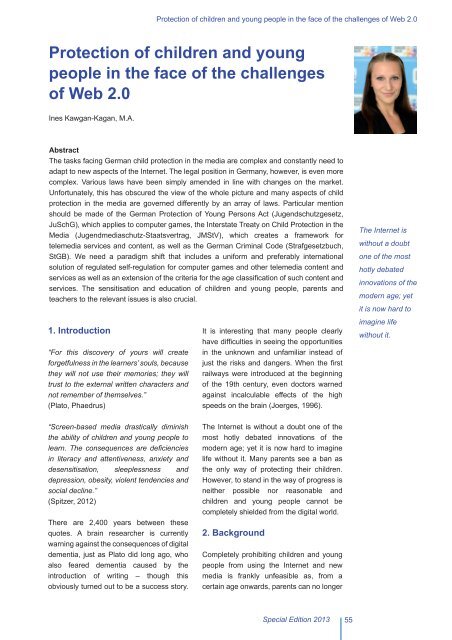ora-schriften-s-2013
ora-schriften-s-2013
ora-schriften-s-2013
You also want an ePaper? Increase the reach of your titles
YUMPU automatically turns print PDFs into web optimized ePapers that Google loves.
Protection of children and young people in the face of the challenges of Web 2.0<br />
Protection of children and young<br />
people in the face of the challenges<br />
of Web 2.0<br />
Ines Kawgan-Kagan, M.A.<br />
Abstract<br />
The tasks facing German child protection in the media are complex and constantly need to<br />
adapt to new aspects of the Internet. The legal position in Germany, however, is even more<br />
complex. Various laws have been simply amended in line with changes on the market.<br />
Unfortunately, this has obscured the view of the whole picture and many aspects of child<br />
protection in the media are governed differently by an array of laws. Particular mention<br />
should be made of the German Protection of Young Persons Act (Jugendschutzgesetz,<br />
JuSchG), which applies to computer games, the Interstate Treaty on Child Protection in the<br />
Media (Jugendmediaschutz-Staatsvertrag, JMStV), which creates a framework for<br />
telemedia services and content, as well as the German Criminal Code (Strafgesetzbuch,<br />
StGB). We need a paradigm shift that includes a uniform and preferably international<br />
solution of regulated self-regulation for computer games and other telemedia content and<br />
services as well as an extension of the criteria for the age classification of such content and<br />
services. The sensitisation and education of children and young people, parents and<br />
teachers to the relevant issues is also crucial.<br />
1. Introduction<br />
“For this discovery of yours will create<br />
forgetfulness in the learners’ souls, because<br />
they will not use their memories; they will<br />
trust to the external written characters and<br />
not remember of themselves.”<br />
(Plato, Phaedrus)<br />
It is interesting that many people clearly<br />
have difficulties in seeing the opportunities<br />
in the unknown and unfamiliar instead of<br />
just the risks and dangers. When the first<br />
railways were introduced at the beginning<br />
of the 19th century, even doctors warned<br />
against incalculable effects of the high<br />
speeds on the brain (Joerges, 1996).<br />
The Internet is<br />
without a doubt<br />
one of the most<br />
hotly debated<br />
innovations of the<br />
modern age; yet<br />
it is now hard to<br />
imagine life<br />
without it.<br />
“Screen-based media drastically diminish<br />
the ability of children and young people to<br />
learn. The consequences are deficiencies<br />
in literacy and attentiveness, anxiety and<br />
desensitisation, sleeplessness and<br />
depression, obesity, violent tendencies and<br />
social decline.”<br />
(Spitzer, 2012)<br />
There are 2,400 years between these<br />
quotes. A brain researcher is currently<br />
warning against the consequences of digital<br />
dementia, just as Plato did long ago, who<br />
also feared dementia caused by the<br />
introduction of writing – though this<br />
obviously turned out to be a success story.<br />
The Internet is without a doubt one of the<br />
most hotly debated innovations of the<br />
modern age; yet it is now hard to imagine<br />
life without it. Many parents see a ban as<br />
the only way of protecting their children.<br />
However, to stand in the way of progress is<br />
neither possible nor reasonable and<br />
children and young people cannot be<br />
completely shielded from the digital world.<br />
2. Background<br />
Completely prohibiting children and young<br />
people from using the Internet and new<br />
media is frankly unfeasible as, from a<br />
certain age onwards, parents can no longer<br />
Special Edition <strong>2013</strong><br />
55





